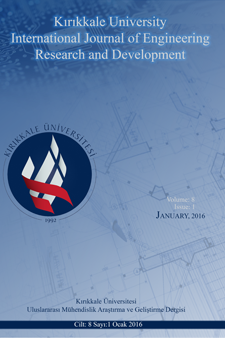Adsorbsiyonlu Soğutma Sistemlerinde Zeolit- Su Buharı Isıl Performansının İncelenmesi
Adsobsiyonlu Soğutma, Soğutucu, Isı Değiştirici, Zeolit
Investigation of Zeolite-Water Vapor Thermal Performance in Adsorption Cooling Systems
Absorption Cooling, Refrigerator, Heat Exchangers, Zeolite,
___
- Ashrae Journal.(2011).Technical Future, Adsobtion Refrigeration. Retrieved from http://www.ashrae.org.tr.
- Demir H. (2008). An experimental and theoretical study on the improvement of adsorption heat pump performance,Doctoral thesis, Middle East Technical University, Ankara, Turkiye.
- Demir H., Mobedi M. And Ülkü S.(2008), A review on adsorption heat pump: Problems and solutions, Renewable and Sustainable Energy Reviews, 12(2008), p. 2381–2403
- Mobedi, M. (2007). A review on adsorption heat pump: Problems and solutions. Renewable and Sustainable Energy Reviews, 12 (2008), 2381–2403-2381–2403.
- Solmuş, İ. (2011). An experimental study on the performance of an adsorptıon Cooling system and the numerical analysis of its adsorbent bed,Doctoral thesis, Middle East Technical University, Ankara, Turkiye.
- Ülkü S.(1986),Solar Adsorbtion Heat Pumps, Volume 129 of the series NATO ASI Series pp 424-435
- Wang, R.Z.(2001). “Performance improvement of adsorption cooling by heat and mass recovery operation.” International Journal of Refrigeration 24(7):602 – 611.
- Wang, R.Z., R.G. Oliveira, (2006). “Adsorption refrigeration, An efficient way to make good use of waste heat and solar energy”, Prog¬ress in Energy and Combustion Science, 32(4), p.424 – 458.
- Wang, D.C., et al.(2010). “A review on adsorption refrigeration technology and adsorption deterioration in physical adsorption sys¬tems.” Renewable and Sustainable Energy Reviews 14(1):344 – 353.
- Yıldırım Z. E., İliş G.G., Mobedi M., Ülkü S.(2011), Adsorpsionlu Chillerlerde Kullanılabilecek Adsorbent – Adsorbat Çiftlerinin Özellikleri ve Çevrim Performanslarının incelenmesi, X. Ulusal tesisat mühendisliğ kongresi, İzmir, 13/16 Nisan.
- Başlangıç: 2009
- Yayıncı: -
Fulya ÇALLIALP KUNTER, Funda CIRIK ACIKAYA
Akaryakıt Sektörü için Metamalzeme Tabanlı Sensör Tasarımı ve Uygulaması
Furkan DİNÇER, Kemal DELİHACIOĞLU, Mehmet Ali TÜMKAYA, Muharrem KARAASLAN, Cumali SABAH
Murat İNAL, Beste ÇAĞDAŞ TUNALI, Mustafa YİĞİTOĞLU
Kırıkkale Üniversitesi Güvenlik Görevlileri İçin Vardiya Çizelgeleme Problemine Bir Çözüm Önerisi
Ceren CİRİTCİOĞLU, Senanur AKGÜN, Emre VARLI, Tamer EREN
Mehmet Sait CENGİZ, Mehmet Salih MEMİŞ, Metin KAYNAKLI
Türkiye’deki Depremlerde Alınan ve Alınabilecek Önlemler
Yatay Eksenli Bir Rüzgâr Türbin Kanat Dizaynı
Mehmet TEKELİ, Mehmet ÖZTÜRK, Mehmet BAHADIR
Arzu ALTIN YAVUZ, Ebru GÜNDOĞAN AŞIK
Kuvars ve Metakaolen Katkısının Jeopolimerlerin Özellikleri Üzerine Etkisi
